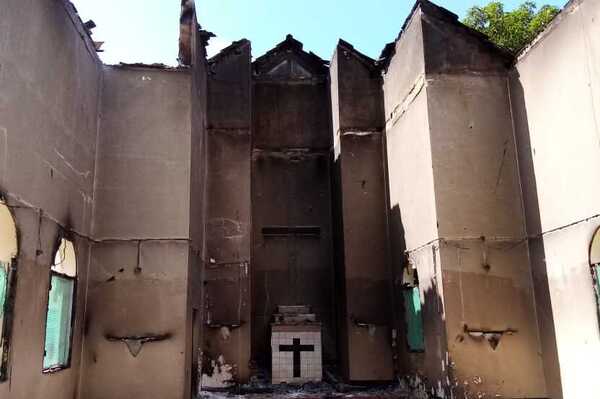IN AN INTERVIEW WITH AID TO THE CHURCH IN NEED (ACN), Bishop Antonio Juliasse, the apostolic administrator of the Diocese of Pemba, in the province of Cabo Delgado in northern Mozambique, a region that since 2017 has seen a rash of terrorist attacks.
What is your assessment of your first six months in charge of the Diocese of Pemba?
I arrived one month after the attack on the town of Palma, an event that increased the sense of insecurity throughout the province of Cabo Delgado. That event left us all shaken. There were many phone calls from the general superiors of the religious congregations, wondering whether it would be advisable or not to withdraw their members from the diocese of Pemba. I believe we got through that time together, and it was good to find a way in the darkness and good that God was with us at that moment, helping us to make a deeper discernment. It is good also to discover this deeper perspective of our mission and our Christian commitment, and our response to the dimension of martyrdom—since nobody goes looking for martyrdom, yet it is something that can happen at any moment.
“We may well be at risk, but at the same time we are here on a mission, and we are here for Jesus. We have to stay on here.” I was deeply moved to hear responses like these from the missionaries and their superiors. There was also another front to work on, more humanitarian in nature, namely the arrival of the refugees.
What about the psychological support being offered by the Church?
The Church is very involved in this work of psychological support. We have trained teams going into all the places where the refugees are living. We understand that it is not always easy to do, since psychological support of this kind requires rather more dedication and what we call “walking together,” and there are so many people involved. We simply don’t have the physical capacity to accompany everyone at the same time. At the same time, our psychological and social support also involves the strengthening of the existing family and community networks, so that these networks can also function as a means of healing for their members.

What are the most urgent needs now in the diocese of Pemba?
When we visit the refugee camps, we see all kinds of people—children, adolescents, adults, old people. Every one of them has his or her own story to tell, a difficult story because it is a story of suffering. And every one of them wants us to listen to them and to hear their concerns. And these concerns start with the most basic necessities. There are many things that are urgent. I am not giving priority only to emergency aid, but food and healthcare continue to be an urgent need for this great number of refugees. There has been a lack of basic medicines everywhere. This is also an urgent aspect of our aid program, because otherwise there could be an outbreak of certain diseases in the camps. It is also urgent to provide people with COVID-19 vaccines.
As far as food aid is concerned, the people eat one day, and next day they need food again, and so it continues. It’s not something you can give once only; it has to be ongoing, until the families are able to support themselves. The sowing time will start soon, with the rains, espe
 cially the maize, yucca, and the other staple food crops. We have to make sure that the families have the necessary means, and this involves having a mattock, an axe, everything they need to work the fields. At the same time we also have to make sure they have enough land to grow their crops on.
cially the maize, yucca, and the other staple food crops. We have to make sure that the families have the necessary means, and this involves having a mattock, an axe, everything they need to work the fields. At the same time we also have to make sure they have enough land to grow their crops on.
What about the spiritual dimension?
This is a priority for the Church and requires a pastoral outreach involving the integration of the refugees in the religious life of the places where they find themselves. There
are tensio
ns between the local people and those who have welcomed the refugees. This is also one of the aspects where the Church has a role to play, starting with the local Christian leaders and influencing the local leaders to promote a climate of friendly coexistence between the refugees and those who are already living in the area.
What would you like to say to the donors of ACN?
ACN is very important to us, it has been a companion, a close and friendly helping hand, always walking together with the Church in Mozambique. On behalf of the Diocese of Pemba and all the people of Cabo Delgado, I would like to thank you for all the financial aid we have received and all the particular ways you have helped, and also all the help that we have received through what we cannot see, namely your prayers.





